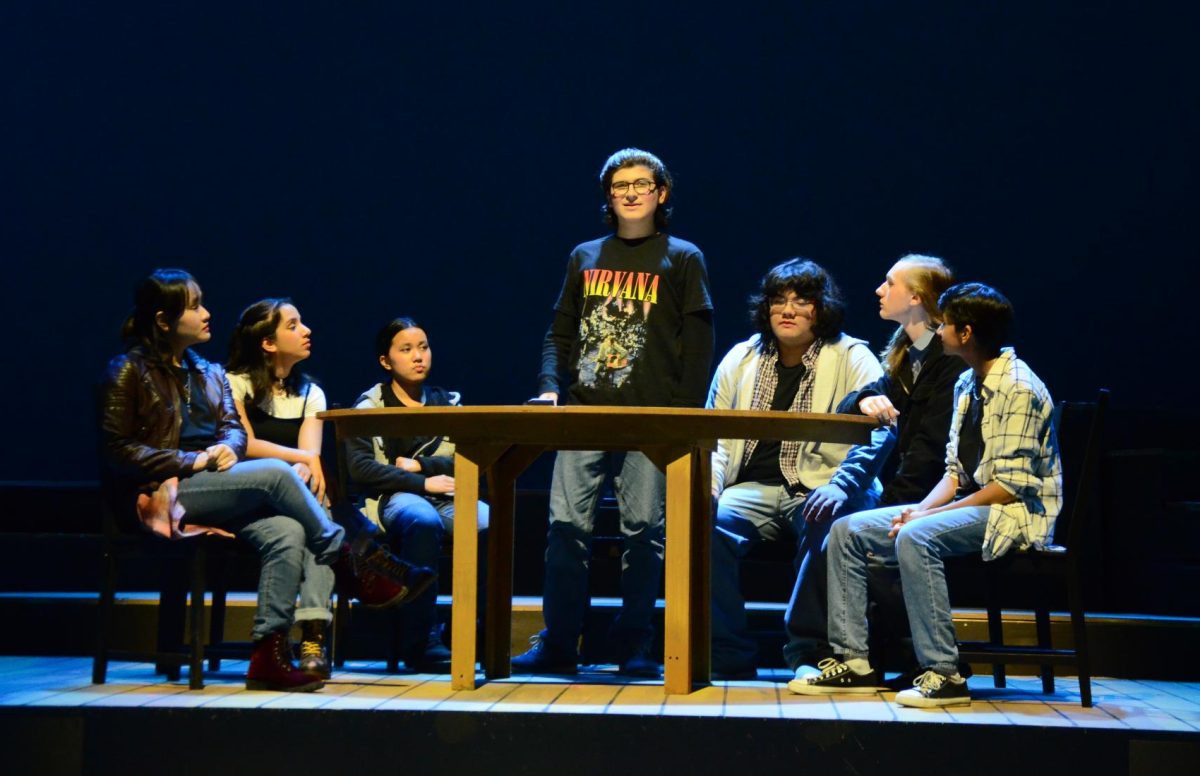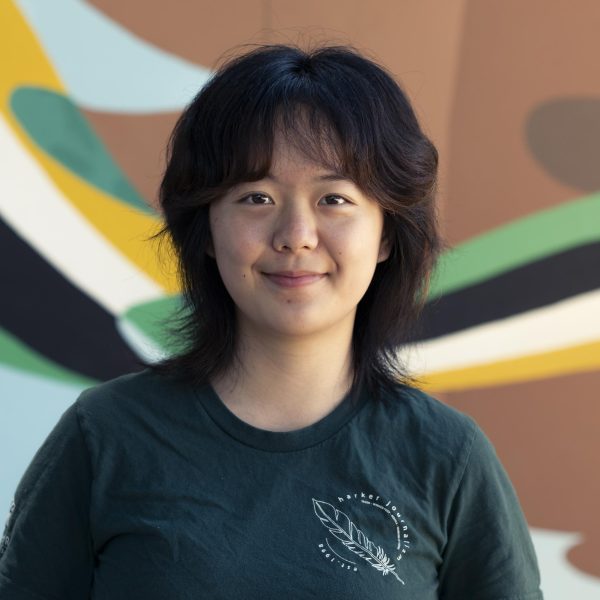Trigger warning: This article involves topics including assault and death. We advise readers who may be sensitive about these topics to reconsider reading this piece.
A pale-yellow spotlight illuminates a table at the center of the stage. Sergeant Hing, played by Thomas Campisi (10), slings his feet onto the tabletop and delivers his thoughts on living in the small Wyoming town of Laramie. Rebecca Hilliker, portrayed by Holly Templeton (10), joins him, voicing her thoughts on happiness and self-reflection. Characters file on and off-stage as the story progresses, each divulging their fragment of the greater story.
So begins this year’s fall play, “The Laramie Project,” written by Moisés Kaufman and the Tectonic Theater Project. The production takes its audience through bars, courthouses and media frenzy while emphasizing the necessity of compassion in the face of hate. The cast performed shows on Thursday, Friday and Saturday at 7 p.m. in the Patil Theater of the Rothschild Performing Arts Building (RPAC). Tickets cost $8 for students and $15 for adults.
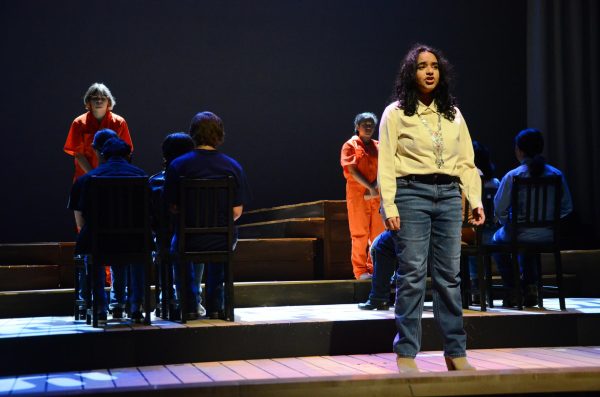
“The Laramie Project” tells the story of the brutal murder of Matthew Shepard, a 21-year-old gay University of Wyoming student, due to his sexual orientation. After Aaron McKinney and Russell Henderson beat and tortured Shepard on the night of Oct. 6, 1998, the Tectonic Theater Project traveled to the titular town of Laramie. Through the voices of Laramie residents, law enforcement and Shepard’s family and friends, the play examines how the murder affected the town’s reputation. It highlights the stark divisions in public response, from shock and grief to anger and confusion.
Unlike a traditional narrative, the play unfolds as a series of interviews, monologues and reenactments based on real conversations by members of the Tectonic Theater Project with Laramie residents following Shepard’s murder. Audience member Sophia Bagley (10) recognized the importance of continuing Matthew Shepard’s legacy to help increase awareness of LGBTQ+ discrimination.
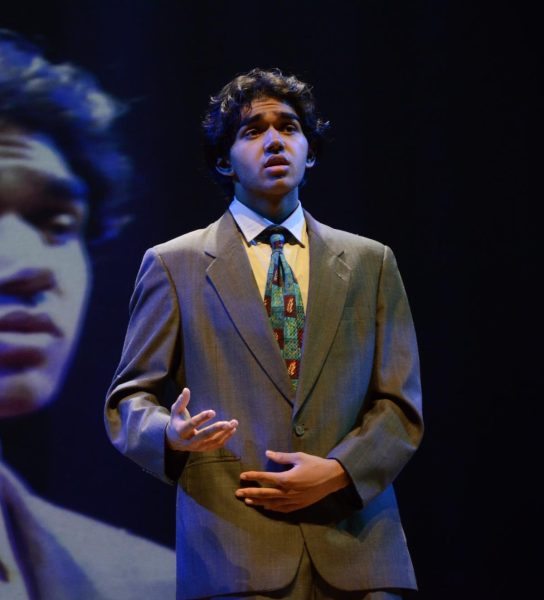
“[‘The Laramie Project’] has a really deep, meaningful story,” Sophia said. “It was a really important story to tell. My biggest takeaway was learning about Matthew’s story and being more aware of hate crimes. This really educated me on the story of Matthew Shepherd, which I had no idea what it was about.”
Initial rehearsals focused on blocking, involving positioning and interactions with props. Duncan Marquart (9), who played Moisés Kaufman, the leader of the Tectonic Theater Project, appreciated working as a member of the production and bonding with his fellow cast mates.
“I really love everyone here because they’re just so welcoming and exciting to be with,” Duncan said. “Although we were tired and drilling over and over again and everyone was exhausted, we all were still having fun and giggling because we were together as a cast.”
As each member of the cast performed for three or four characters, the emphasis of rehearsals in October shifted towards character development, delving into the intricacies of the characters each actor portrayed. Students in the technical theater program built the set, and rehearsals moved to the Patil Theater so that the cast could practice their scenes with the stage.
During “Tech Saturday,” on Oct. 21, the cast executed a full run with costumes and lights. Actors spent the entire day from 9 a.m. to 8 p.m. working on their performances. The show, which included over 350 cues, proved a challenge for first-time stage manager Maggie Yan (12) to maintain organization.
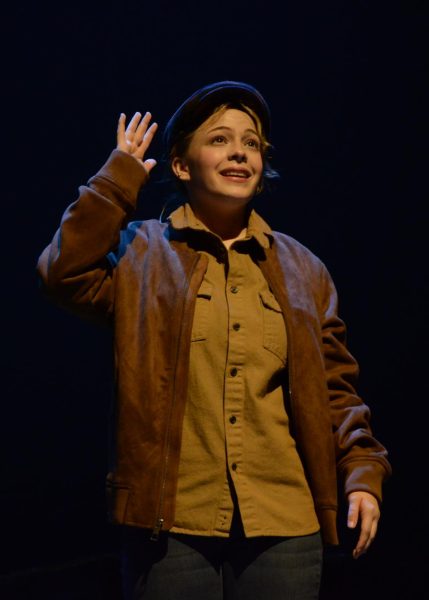
“I have the master book of all the cues,” Maggie said. “So every time something on stage changes, like a lighting change, a sound cue going on or off, I call out when everything happens so that people don’t have to look up and down at the script and up and down again. It’s how to get everyone to cooperate smoothly.”
The week leading up to the final show was designated as ‘tech week,’ encompassing costume changes and the integration of lights and sound. Wardrobe team member Cindy Yu (11) ensured costumes were in the correct places, oversaw the quick-changes between scenes and steamed the clothing.
“Working with all the other tech people was very interesting,” Cindy said. “Everyone’s a little sleep deprived and a little crazy, but that’s a part of the fun. There are a lot of interesting conversations going on over the headset.”
Upper school drama teacher and “The Laramie Project” director Brandi Griffith held the first round of auditions over Zoom from Aug. 28 to 30 where actors auditioned with two-minute monologues. The next day Griffith sent callbacks, which she hosted on Aug. 31 and Sep. 1., and specific monologues for actors to perform.
Not only a tribute to Matthew Shepard’s memory, “The Laramie Project” urges its audiences to confront prejudice, homophobia and violence against the LGBTQ+ community.
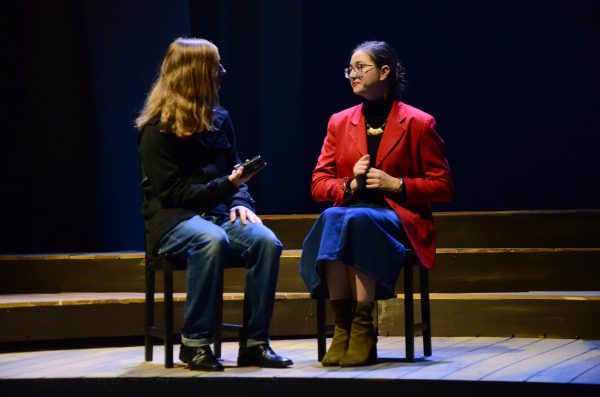
“[‘The Laramie Project’] is very important and, unfortunately, still relevant to today,” Duncan said. “It’s a very important message that we’re sending out, and it’s kind of sad that we still have to have this kind of play. But I definitely think that these are the kind of things that promote change, change minds, change opinions and ultimately shape society.”


















![“[Building nerf blasters] became this outlet of creativity for me that hasn't been matched by anything else. The process [of] making a build complete to your desire is such a painstakingly difficult process, but I've had to learn from [the skills needed from] soldering to proper painting. There's so many different options for everything, if you think about it, it exists. The best part is [that] if it doesn't exist, you can build it yourself," Ishaan Parate said.](https://harkeraquila.com/wp-content/uploads/2022/08/DSC_8149-900x604.jpg)




![“When I came into high school, I was ready to be a follower. But DECA was a game changer for me. It helped me overcome my fear of public speaking, and it's played such a major role in who I've become today. To be able to successfully lead a chapter of 150 students, an officer team and be one of the upperclassmen I once really admired is something I'm [really] proud of,” Anvitha Tummala ('21) said.](https://harkeraquila.com/wp-content/uploads/2021/07/Screen-Shot-2021-07-25-at-9.50.05-AM-900x594.png)







![“I think getting up in the morning and having a sense of purpose [is exciting]. I think without a certain amount of drive, life is kind of obsolete and mundane, and I think having that every single day is what makes each day unique and kind of makes life exciting,” Neymika Jain (12) said.](https://harkeraquila.com/wp-content/uploads/2017/06/Screen-Shot-2017-06-03-at-4.54.16-PM.png)








![“My slogan is ‘slow feet, don’t eat, and I’m hungry.’ You need to run fast to get where you are–you aren't going to get those championships if you aren't fast,” Angel Cervantes (12) said. “I want to do well in school on my tests and in track and win championships for my team. I live by that, [and] I can do that anywhere: in the classroom or on the field.”](https://harkeraquila.com/wp-content/uploads/2018/06/DSC5146-900x601.jpg)
![“[Volleyball has] taught me how to fall correctly, and another thing it taught is that you don’t have to be the best at something to be good at it. If you just hit the ball in a smart way, then it still scores points and you’re good at it. You could be a background player and still make a much bigger impact on the team than you would think,” Anya Gert (’20) said.](https://harkeraquila.com/wp-content/uploads/2020/06/AnnaGert_JinTuan_HoHPhotoEdited-600x900.jpeg)

![“I'm not nearly there yet, but [my confidence has] definitely been getting better since I was pretty shy and timid coming into Harker my freshman year. I know that there's a lot of people that are really confident in what they do, and I really admire them. Everyone's so driven and that has really pushed me to kind of try to find my own place in high school and be more confident,” Alyssa Huang (’20) said.](https://harkeraquila.com/wp-content/uploads/2020/06/AlyssaHuang_EmilyChen_HoHPhoto-900x749.jpeg)



